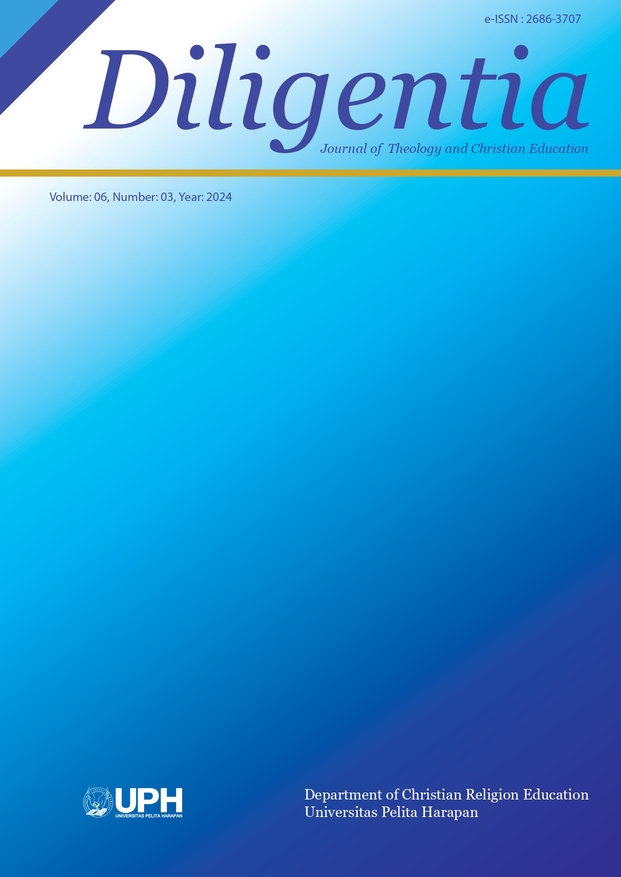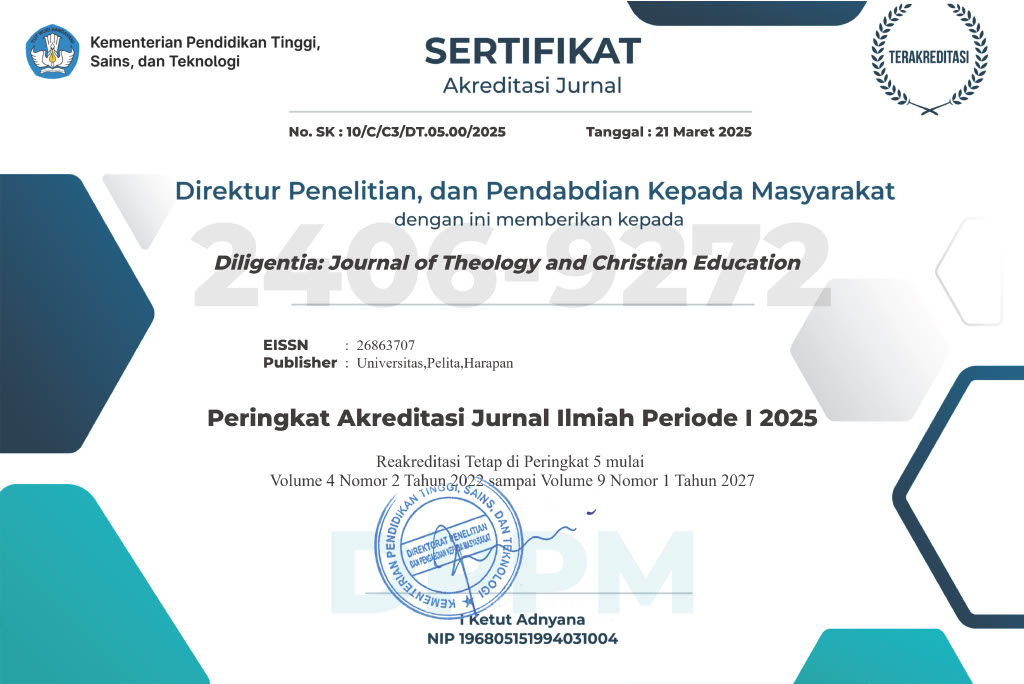Embracing Christian Values: Positive Relationships and Academic Achievement in Higher Education
DOI:
https://doi.org/10.19166/dil.v6i3.8717Kata Kunci:
Higher Education, Positive Relationships, Christian Principles, Biblical Wisdom, Academic SuccessAbstrak
This literature review and analysis intricately examines the dynamic interplay between educators and students within the realm of higher education, with a keen focus on the spiritual dimensions elucidated by Christian principles and biblical wisdom. Rooted in the fundamental belief that education embodies a sacred journey, this study delves deep into the profound impact of positive relationships on both academic achievements and spiritual maturation. By establishing meaningful connections between contemporary educational practices and timeless biblical teachings, the research sheds light on how Christian virtues, such as love, compassion, and empathy, serve as foundational pillars in cultivating a spiritually enriching learning environment. The synthesis of empirical studies, theoretical frameworks, and biblical insights not only enhances our understanding of the transformative potential of positive relationships in higher education but also underscores their pivotal role in fostering holistic development on a spiritual level. Through this comprehensive exploration, the study contributes significantly to the discourse on the symbiotic relationship between academic success and spiritual growth, emphasizing the importance of nurturing positive relationships as a cornerstone of holistic education in higher learning institutions.
Referensi
Amerstorfer, Carmen M., and Clara Freiin von Münster-Kistner. “Student Perceptions of Academic Engagement and Student-Teacher Relationships in Problem-Based Learning.” Frontiers in Psychology 12 (October 2021): 1-18. https://doi.org/10.3389/fpsyg.2021.713057.
Anburaj Balraj, Noah. “Foundational Elements of Maslow’s Hierarchy of Needs and Jesus Christ’s Teachings of Human Need Management.” Catalyst 15, no. 1 (2017): 77-87.
Anderson, Lynne E., and John Carta-falsa. “Factors That Make Faculty and Student Relationships Effective.” College Teaching 50, no. 4 (October 2002): 134-38. https://doi.org/10.1080/87567550209595894.
Avila Kaminski, Amanda. “Conversion, Apostasy, or Hybridity? The Terrible, Troubled, Transformative Experience of Paul as Exemplar for Missiology in an Age of Multiplicity.” Missiology: An International Review 50, no. 1 (January 2022): 91-104. https://doi.org/10.1177/00918296211039567.
Bairaktarova, Diana, and Anna Woodcock. “Engineering Student’s Ethical Awareness and Behavior: A New Motivational Model.” Science and Engineering Ethics 23, no. 4 (August 2017): 1129-57. https://doi.org/10.1007/s11948-016-9814-x.
Balg, Dominik. “Moral Disagreement and Moral Education: What’s the Problem?” Ethical Theory and Moral Practice 27 (June 2023): 5-24. https://doi.org/10.1007/s10677-023-10399-9.
Billett, Stephen. “Integrating Learning Experiences across Tertiary Education and Practice Settings: A Socio-Personal Account.” Educational Research Review 12 (June 2014): 1-13. https://doi.org/10.1016/j.edurev.2014.01.002.
Bondy, Elizabeth, Dorene D. Ross, Caitlin Gallingane, and Elyse Hambacher. “Creating Environments of Success and Resilience.” Urban Education 42, no. 4 (July 2007): 326-48. https://doi.org/10.1177/0042085907303406.
Bücker, Susanne, Sevim Nuraydin, Bianca A. Simonsmeier, Michael Schneider, and Maike Luhmann. “Subjective Well-Being and Academic Achievement: A Meta-Analysis.” Journal of Research in Personality 74 (June 2018): 83-94. https://doi.org/10.1016/j.jrp.2018.02.007.
Camacho, Danielle J., and Jill M. Legare. “Shifting Gears in the Classroom””Movement toward Personalized Learning and Competency”based Education.” The Journal of Competency-Based Education 1, no. 4 (December 2016): 151-56. https://doi.org/10.1002/cbe2.1032.
Capone, Vincenza, Anna Rosa Donizzetti, and Giovanna Petrillo. “Classroom Relationships, Sense of Community, Perceptions of Justice, and Collective Efficacy for Students’ Social Well”being.” Journal of Community Psychology 46, no. 3 (April 2018): 374-82. https://doi.org/10.1002/jcop.21943.
Chalmers. “Rethinking Luke 10: The Parable of the Good Samaritan Israelite.” Journal of Biblical Literature 139, no. 3 (2020): 543. https://doi.org/10.15699/jbl.1393.2020.6.
CO, M.A. “The Major Summarities in Acts: Acts 2,42-47; 4,32-35; 5,12-16.” Ephemerides Theologicae Lovanienses 68, no. 1 (April 1992): 49-85. https://doi.org/10.2143/ETL.68.1.542163.
Colon, Myrna. “A Biblical Framework for Service Learning.” The Journal of Biblical Foundations of Faith and Learning 2, no. 1 (2017): 17.
Côté, I. M., P. S. Curtis, H. R. Rothstein, and G. B. Stewart. “4. Gathering Data: Searching Literature and Selection Criteria.” In Handbook of Meta-Analysis in Ecology and Evolution, 37-51. Princeton University Press, 2013. https://doi.org/10.1515/9781400846184-006.
Davis, Nicola, Alison C Clark, Martina O’Brien, Caroline Plaice, Karen Sumpton, and Suzanne Waugh. Learning Skills for Nursing Students. Learning Skills for Nursing Students. 1 Oliver’s Yard, 55 City Road London EC1Y 1SP : SAGE Publications, Inc., 2011. https://doi.org/10.4135/9781526435750.
Dobrow, Shoshana R., Hannah Weisman, Daniel Heller, and Jennifer Tosti-Kharas. “Calling and the Good Life: A Meta-Analysis and Theoretical Extension.” Administrative Science Quarterly 68, no. 2 (June 2023): 508-50. https://doi.org/10.1177/00018392231159641.
Duta, Nicoleta, Georgeta Panisoara, and Ion-Ovidiu Panisoara. “The Effective Communication in Teaching. Diagnostic Study Regarding the Academic Learning Motivation to Students.” Procedia - Social and Behavioral Sciences 186 (May 2015): 1007-12. https://doi.org/10.1016/j.sbspro.2015.04.064.
DzimiÅ„ska, MaÅ‚gorzata, Justyna FijaÅ‚kowska, and Åukasz SuÅ‚kowski. “Trust-Based Quality Culture Conceptual Model for Higher Education Institutions.” Sustainability 10, no. 8 (July 2018): 2599. https://doi.org/10.3390/su10082599.
Edwards-Groves, Christine, and Peter Grootenboer. “Conceptualising Five Dimensions of Relational Trust: Implications for Middle Leadership.” School Leadership & Management 41, no. 3 (May 2021): 260-83. https://doi.org/10.1080/13632434.2021.1915761.
Epstein, Mikhail. “Paradoxical Speech Acts: Transformatives and Counterformatives.” Parallax 21, no. 2 (April 2015): 134-42. https://doi.org/10.1080/13534645.2015.1022366.
Esqueda, Octavio Javier. “Biblical Worldview: The Christian Higher Education Foundation for Learning.” Christian Higher Education 13, no. 2 (March 2014): 91-100. https://doi.org/10.1080/15363759.2014.872495.
Florian, Lani. “Conceptualising Inclusive Pedagogy: The Inclusive Pedagogical Approach in Action,” 7:11-24. Emerald Group Publishing Limited, 2015. https://doi.org/10.1108/S1479-363620150000007001.
Gibbs, John C. “Moral Development, Moral Identity, and Prosocial Behavior.” In Moral Development and Reality, 157-79. Oxford University Press, 2019. https://doi.org/10.1093/oso/9780190878214.003.0006.
Hammond, Michael D. “Christian Higher Education in the United States: The Crisis of Evangelical Identity.” Christian Higher Education 18, no. 1-2 (January 2019): 3-15. https://doi.org/10.1080/15363759.2018.1554352.
Han, Meekyung, and Helen Pong. “Mental Health Help-Seeking Behaviors Among Asian American Community College Students: The Effect of Stigma, Cultural Barriers, and Acculturation.” Journal of College Student Development 56, no. 1 (2015): 1-14. https://doi.org/10.1353/csd.2015.0001.
Harris, Alan. “Morality as a ”˜Subject.’” In Teaching Morality and Religion, 30-36. Routledge, 2018. https://doi.org/10.4324/9780429030765-5.
Hendricks, Karin S., Diana R. Dansereau, Betty Bauman-Field, and Cheryl M. Freeze. “Fostering Trust in Music Classrooms: A Review of the Literature.” Update: Applications of Research in Music Education, June 29, 2023. https://doi.org/10.1177/87551233231183366.
Hershkovitz, Arnon, and Alona Forkosh Baruch. “Student-Teacher Relationship in the Facebook Era: The Student Perspective.” International Journal of Continuing Engineering Education and Life-Long Learning 23, no. 1 (2013): 33-52. https://doi.org/10.1504/IJCEELL.2013.051765.
Hyun, Chul, and Paul Kim. “Reading the Joseph Story (Genesis 37-50) as a Diaspora Narrative.” The Catholic Biblical Quarterly 75, no. 2 (2013): 219-38. https://www.jstor.org/stable/43728173.
Janssen, Onne, and Evert van de Vliert. “Concern for the Other’s Goals: Key to (De”)Escalation of Conflict.” International Journal of Conflict Management 7, no. 2 (February 1996): 99-120. https://doi.org/10.1108/eb022777.
Kahu, Ella R., and Karen Nelson. “Student Engagement in the Educational Interface: Understanding the Mechanisms of Student Success.” Higher Education Research & Development 37, no. 1 (January 2018): 58-71. https://doi.org/10.1080/07294360.2017.1344197.
Kapusuzoglu, Saduman. “An Investigation of Conflict Resolution in Educational Organizations.” African Journal of Business Management 4, no. 1 (2010): 96-102. http://www.academicjournals.org/AJBM.
Kirby, John R., Christopher Knapper, Patrick Lamon, and William J. Egnatoff. “Development of a Scale to Measure Lifelong Learning.” International Journal of Lifelong Education 29, no. 3 (May 2010): 291-302. https://doi.org/10.1080/02601371003700584.
Li, Ying, Hongduo Cao, and Ying Zhang. “Static and Dynamic Structure Characteristics of a Trust Network and Formation of User Trust in an Online Society.” Social Networking 07, no. 4 (2018): 197-219. https://doi.org/10.4236/sn.2018.74016.
Lodi, Ernesto, Lucrezia Perrella, Gian Luigi Lepri, Maria Luisa Scarpa, and Patrizia Patrizi. “Use of Restorative Justice and Restorative Practices at School: A Systematic Literature Review.” International Journal of Environmental Research and Public Health 19, no. 1 (December 2021): 96. https://doi.org/10.3390/ijerph19010096.
Lund, Terese J., Belle Liang, Lily Konowitz, Allison E. White, and Angela DeSilva Mousseau. “Quality over Quantity? Mentoring Relationships and Purpose Development among College Students.” Psychology in the Schools 56, no. 9 (November 2019): 1472-81. https://doi.org/10.1002/pits.22284.
Maiaweng, Peniel C D. “Understanding of Wisdom in the Book of Daniel.” Jurnal Jaffray 14, no. 1 (2016): 93-108. http://www.auss.info/.
McKay, Cathy, and Grace Macomber. “The Importance of Relationships in Education: Reflections of Current Educators.” Journal of Education 203, no. 4 (October 2023): 751-58. https://doi.org/10.1177/00220574211057044.
Morton, Brenda M. “Trauma-Informed School Practices: Creating Positive Classroom Culture.” Middle School Journal 53, no. 4 (August 2022): 20-27. https://doi.org/10.1080/00940771.2022.2096817.
Onyinah, Opoku. “The Meaning of Discipleship.” International Review of Mission 106, no. 2 (December 2017): 216-27. https://doi.org/10.1111/irom.12181.
Parsons, Seth A., Margaret Vaughn, Roya Qualls Scales, Melissa A. Gallagher, Allison Ward Parsons, Stephanie G. Davis, Melissa Pierczynski, and Melony Allen. “Teachers’ Instructional Adaptations: A Research Synthesis.” Review of Educational Research 88, no. 2 (April 2018): 205-42. https://doi.org/10.3102/0034654317743198.
Pfeifer, Heather L. “How to Be a Good Academic Citizen: The Role and Importance of Service in Academia.” Journal of Criminal Justice Education 27, no. 2 (April 2016): 238-54. https://doi.org/10.1080/10511253.2015.1128706.
Reinke, Wendy M., Melissa Stormont, Keith C. Herman, Rohini Puri, and Nidhi Goel. “Supporting Children’s Mental Health in Schools: Teacher Perceptions of Needs, Roles, and Barriers.” School Psychology Quarterly 26, no. 1 (March 2011): 1-13. https://doi.org/10.1037/a0022714.
Rozas, Lisa Werkmeister, and Waldo C. Klein. “The Value and Purpose of the Traditional Qualitative Literature Review.” Journal of Evidence-Based Social Work 7, no. 5 (November 2010): 387-99. https://doi.org/10.1080/15433710903344116.
Ryan, Richard M., and Edward L. Deci. “Intrinsic and Extrinsic Motivation from a Self-Determination Theory Perspective: Definitions, Theory, Practices, and Future Directions.” Contemporary Educational Psychology 61 (April 2020): 101860. https://doi.org/10.1016/j.cedpsych.2020.101860.
Sabol, Terri J., and Robert C. Pianta. “Recent Trends in Research on Teacher-Child Relationships.” Attachment & Human Development 14, no. 3 (May 2012): 213-31. https://doi.org/10.1080/14616734.2012.672262.
Sanders, Jackie, and Robyn Munford. “Fostering a Sense of Belonging at School--Five Orientations to Practice That Assist Vulnerable Youth to Create a Positive Student Identity.” School Psychology International 37, no. 2 (April 2016): 155-71. https://doi.org/10.1177/0143034315614688.
Shernoff, David J. Optimal Learning Environments to Promote Student Engagement. Advancing Responsible Adolescent Development. New York, NY: Springer New York, 2013. https://doi.org/10.1007/978-1-4614-7089-2.
Simpson, Evan. “Reasonable Trust.” European Journal of Philosophy 21, no. 3 (September 2013): 402-23. https://doi.org/10.1111/j.1468-0378.2011.00453.x.
Six, Frédérique, and Arndt Sorge. “Creating a High”Trust Organization: An Exploration into Organizational Policies That Stimulate Interpersonal Trust Building.” Journal of Management Studies 45, no. 5 (July 2008): 857-84. https://doi.org/10.1111/j.1467-6486.2007.00763.x.
Steinmayr, Ricarda, Julia Crede, Nele McElvany, and Linda Wirthwein. “Subjective Well-Being, Test Anxiety, Academic Achievement: Testing for Reciprocal Effects.” Frontiers in Psychology 6, (January 2016). https://doi.org/10.3389/fpsyg.2015.01994.
Stroope, Samuel. “How Culture Shapes Community: Bible Belief, Theological Unity, and a Sense of Belonging in Religious Congregations.” The Sociological Quarterly 52, no. 4 (September 2011): 568-92. https://doi.org/10.1111/j.1533-8525.2011.01220.x.
Sullivan, John. “Worship and Learning.” In The Christian Academic in Higher Education, 143-66. Cham: Springer International Publishing, 2018. https://doi.org/10.1007/978-3-319-69629-4_6.
Waldron, Vincent R., Dayna Kloeber, Carmen Goman, Nicole Piemonte, and Joshua Danaher. “How Parents Communicate Right and Wrong: A Study of Memorable Moral Messages Recalled by Emerging Adults.” Journal of Family Communication 14, no. 4 (October 2014): 374-97. https://doi.org/10.1080/15267431.2014.946032.
Walker, Christopher O., Barbara A. Greene, and Robert A. Mansell. “Identification with Academics, Intrinsic/Extrinsic Motivation, and Self-Efficacy as Predictors of Cognitive Engagement.” Learning and Individual Differences 16, no. 1 (January 2006): 1-12. https://doi.org/10.1016/j.lindif.2005.06.004.
Walkington, Candace A. “Using Adaptive Learning Technologies to Personalize Instruction to Student Interests: The Impact of Relevant Contexts on Performance and Learning Outcomes.” Journal of Educational Psychology 105, no. 4 (November 2013): 932-45. https://doi.org/10.1037/a0031882.
Waugh, Christian E., and Barbara L. Fredrickson. “Nice to Know You: Positive Emotions, Self-Other Overlap, and Complex Understanding in the Formation of a New Relationship.” The Journal of Positive Psychology 1, no. 2 (April 2006): 93-106. https://doi.org/10.1080/17439760500510569.
Unduhan
Diterbitkan
Cara Mengutip
Terbitan
Bagian
Lisensi
Authors who publish with this journal agree to the following terms:
1) Authors retain copyright and grant the journal right of first publication with the work simultaneously licensed under a Creative Commons Attribution License (CC-BY-SA 4.0) that allows others to share the work with an acknowledgement of the work's authorship and initial publication in this journal.
2) Authors are able to enter into separate, additional contractual arrangements for the non-exclusive distribution of the journal's published version of the work (e.g., post it to an institutional repository or publish it in a book), with an acknowledgement of its initial publication in this journal.
3) Authors are permitted and encouraged to post their work online (e.g., in institutional repositories or on their website). The final published PDF should be used and bibliographic details that credit the publication in this journal should be included














